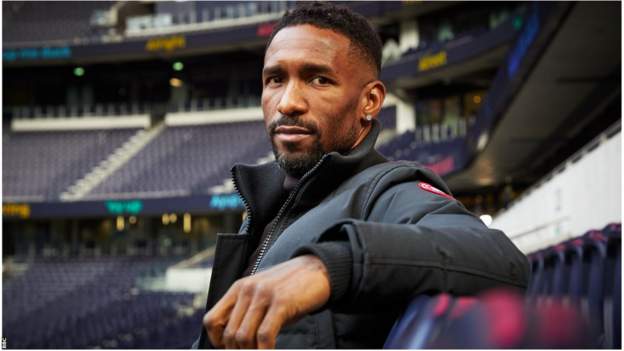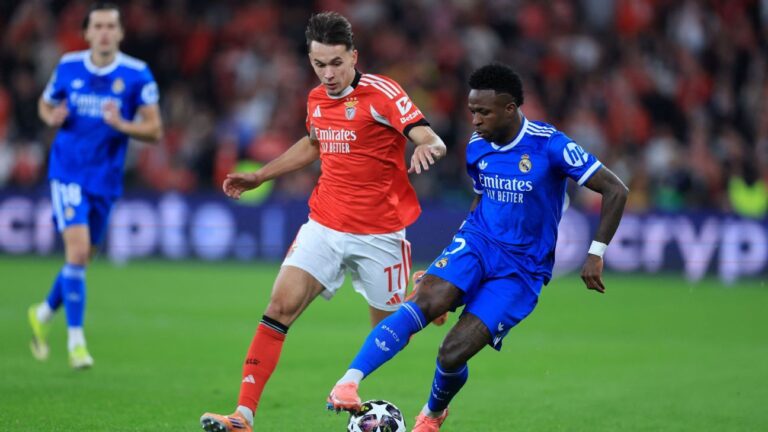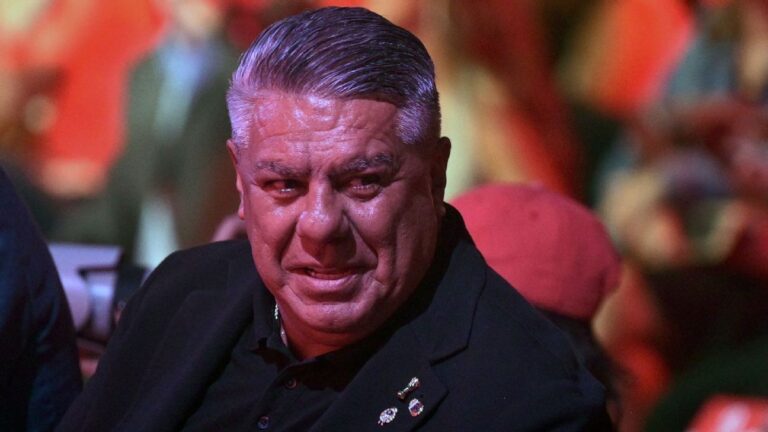It’s no easy job making it as a manager, even if you’re a Premier League legend – just ask Steven Gerrard, Wayne Rooney and Frank Lampard.
That, though, has not put off Jermain Defoe. The former England striker, who retired from playing last year as the Premier League’s ninth highest-ever goalscorer, is embarking on a similar path towards becoming a boss.
A new fly-on-the-wall BBC Radio 5 Live podcast, Jermain Defoe: Outside The Box, follows him as he explores his options – he now works at Tottenham’s academy – and seeks advice from others in the business.
The series follows on from Moment of Truth, which gave access-all-areas insight into managers Paul Warne and Karl Robinson.
Episode one drops on BBC Sounds on Thursday, 9 February and takes us to Defoe’s childhood neighbourhood of Canning Town, East London.
Across 12 episodes, Defoe hears advice from seasoned managers, including David Pleat, Warne and his old boss Harry Redknapp – who took Defoe on at West Ham as a 16-year-old starlet later managed him at Tottenham.
He also speaks to a number of key figures in the game – including Troy Townsend, Chris Hughton and John Barnes – about the scarcity of black managers at the highest level in English football.
BBC Sport spoke to Defoe at the Tottenham Hotspur Stadium, about his hopes, ambitions and reasons for wanting to pursue a career in the dugout.
Football management may be lucrative in the top leagues – but the responsibility is huge. The hours are punishing. The average tenure in a job is just over two years. What’s more, managers are often subject to abuse from fans and pundits who hold them accountable and sometimes think they could do a better job themselves.
“You’re going to get sacked at some point. That’s the job,” as Defoe, 40, put it.
So why does he want to be a boss?
“I love football. It’s as simple as that,” Defoe told BBC Sport, smiling. “I’ve been obsessed with the game since day one and nothing’s changed. I retired last year at 39 and I still had the same feeling that I had when I was a kid going out for a game. Of course, coaching and managing are completely different, but I think that’s the nearest thing you get to playing.
“You still lace your boots up, you’re still out there with the boys.”
Defoe says he’s even more determined after watching some of his England contemporaries go down the same route.
“I’ve seen players like Steven Gerrard, Wayne Rooney, Frank Lampard go on to become managers,” he said. “That makes me want it even more.”
All three of those names have had tough times in management. Rooney left Derby last June as the club fought their way out of a financial crisis and were relegated to League one; Gerrard was sacked by Aston Villa in October; Lampard was dismissed by Everton in January.
Gerrard and Lampard both faced significant criticism, with the latter also operating amid fan revolts against the board at Goodison.
Defoe remains undeterred, and willing to start on the bottom rung.
“It’s no different to when I walked into the West Ham training ground at the age of 16, hoping to work hard and get to the first team,” he said.
“As a player, I always liked to tick every box and give myself the best opportunity to play well. I was always that player that asked a lot of questions. That’s how I approach coaching as well.”
Between his senior debut in September 2000 and his retirement in March 2022, Defoe scored 304 goals in 762 club games, representing a number of big clubs, with passionate fans – including West Ham, Spurs, Sunderland and Rangers.
He also hit 20 goals in 57 England appearances.
Not that he can rely entirely on that CV now.
“You see it all the time – just because you’ve played at the top level, it doesn’t mean you’re going to be a top manager,” said Defoe.
“As a player, you might lose a game, but you’ve played really well. Kylian Mbappe scored a hat-trick in the World Cup final for France, but they still lost. It’s disappointing, but at least you think, ‘I did my job’. Even Conte told me – as a manager, it’s all on you.”
He adds that there were times in his career where he felt that some managers were unfairly scapegoated.
“If a manager gets sacked, sometimes you have a guilty conscience, like ‘it’s not his fault’,” he said. “You see him putting in the work during the week. There’s a gameplan and the players are the ones who’ve got to go and execute it. If you don’t and then the manager gets sacked⦠I realise that’s a part of it.”
Defoe was given an insight into the stresses of management at Rangers, where he played under Gerrard.
“There was one occasion – I think it was against Real Madrid, pre-season. I wasn’t involved, so Stevie told me to pick the team,” he said. “I didn’t know who to put on the bench, because of the quality in the squad. Stevie said to me: ‘This is what I have to deal with every weekend.’
“If you’re leaving players out, it’s a difficult conversation, but that’s the stuff you have to do. I wouldn’t say I’m looking forward to that stuff, but it’s part and parcel.”
A 2022 report showed that while 43% of Premier League and 34% of English Football League players are black, only 4.4% of managers are black.
During the series, Defoe, who has St Lucian heritage, explores the challenges facing black coaches. In episode seven, he will meet Kick It Out’s Troy Townsend, who says: “I don’t trust the coaching industry.”
Reflecting on the issue, Defoe said: “People speak about it all the time. There are not enough black managers – considering the amount of black players we’ve had in the Premier League, some top players, players that I grew up watching, that wanted to go on to be managers and coaches.”
He says there are a number of top players who have, “been overlooked, for whatever reason”.
However, this isn’t something that deters him.
“Everyone’s path’s different,” Defoe said. “If I don’t get an opportunity at some stage, if it doesn’t work out, I’ll say: ‘I tried my best, but it didn’t work out.'”
–




